7 Inspiring Politicians in Wheelchairs Who Made History
Introduction
Throughout history, people with disabilities have faced barriers in politics, but some leaders have shattered those barriers, proving that leadership is about determination, intelligence, and resilience—not physical ability. From Franklin D. Roosevelt, who guided the U.S. through its most difficult decades, to Tammy Duckworth, a war hero advocating for veterans, these politicians have demonstrated extraordinary perseverance right from their wheelchairs.
This article highlights seven politicians who used wheelchairs and made an undeniable impact on politics. Their personal struggles and triumphs serve as an inspiration for anyone facing adversity.
1. Franklin D. Roosevelt – The U.S. President Who Led Through Crisis
Franklin D. Roosevelt (FDR) was the 32nd President of the United States, serving from 1933 until his death in 1945. His leadership during the Great Depression and World War II cemented him as one of the most influential presidents in American history. Here’s a deeper look at his life, challenges, and accomplishments:
Early Life and Political Beginnings
- Born in 1882 in Hyde Park, New York, into a wealthy and politically connected family.
- He was a distant cousin of former President Theodore Roosevelt and married Eleanor Roosevelt, his fifth cousin once removed.
- FDR entered politics as a New York state senator and later served as Assistant Secretary of the Navy under President Woodrow Wilson.
Polio and Personal Struggles
- In 1921, at the age of 39, FDR was diagnosed with polio, which left him permanently paralyzed from the waist down.
- Despite exhaustive treatments, including hydrotherapy in Warm Springs, Georgia, he never regained the ability to walk.
- He used leg braces, a cane, and the support of aides to stand at public events, carefully managing his image to avoid appearing weak in a time when disability was stigmatized.
Rise to the Presidency
- Despite his disability, FDR re-entered politics, winning the governorship of New York in 1928.
- In 1932, during the depths of the Great Depression, he won the presidency in a landslide.
Major Achievements as President
- The New Deal: Introduced social and economic reforms, including Social Security, public works programs, and banking regulations, to combat the Great Depression.
- World War II Leadership: Led the U.S. through World War II, forging alliances with Britain and the Soviet Union and playing a key role in the formation of the United Nations.
- Four-Term Presidency: The only U.S. president elected to four terms, reflecting his widespread popularity and leadership during crises.
Legacy and Death
- FDR passed away on April 12, 1945, just months before the end of World War II.
- His leadership reshaped the role of government in American society and set a precedent for economic intervention and global diplomacy.
- His Warm Springs Foundation later became the Roosevelt Warm Springs Institute for Rehabilitation, continuing his legacy of helping people with disabilities.
Roosevelt’s ability to lead the nation despite his paralysis remains an inspiration, proving that physical challenges do not define a person’s ability to govern and inspire millions.
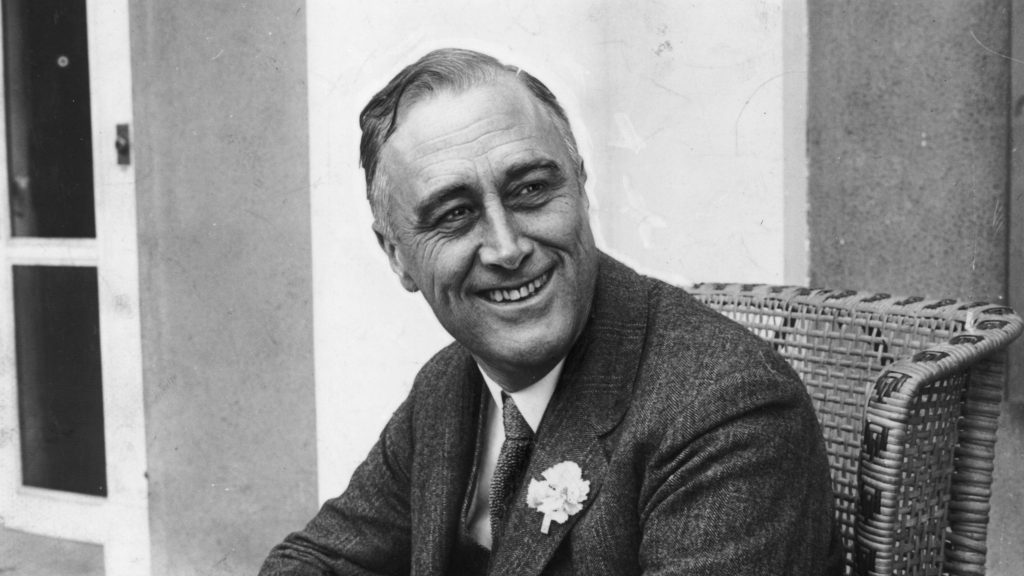
2. Tammy Duckworth – A War Hero Turned U.S. Senator
Tammy Duckworth is a decorated military veteran, a double amputee, and a U.S. Senator who has broken multiple barriers in American politics. Her life is a testament to resilience, courage, and dedication to public service.
Early Life and Background
- Full Name: Ladda Tammy Duckworth
- Born: March 12, 1968, in Bangkok, Thailand
- Heritage: Duckworth is of mixed Thai-Chinese and American descent. Her father, Franklin Duckworth, was a U.S. Army veteran, and her mother, Lamai, was Thai.
- Childhood Struggles: She spent much of her early life in Southeast Asia before her family moved to Hawaii. They faced financial struggles, and at one point, they relied on food stamps to survive.
- Education: Despite hardships, she earned a Bachelor’s degree in Political Science from the University of Hawaii and later a Master’s in International Affairs from George Washington University.
Military Career and Tragic Combat Injury
- Inspired by her father’s military service, Duckworth joined the U.S. Army Reserve in 1992 and later became a commissioned officer in the Illinois Army National Guard.
- She trained as a Black Hawk helicopter pilot, one of the few combat roles open to women at the time.
- Injury in Combat:
- On November 12, 2004, while flying a combat mission in Iraq, Duckworth’s helicopter was struck by a rocket-propelled grenade (RPG) launched by insurgents.
- The explosion resulted in the loss of both of her legs and severe damage to her right arm.
- Despite her critical injuries, she remained conscious as the helicopter crash-landed. Her co-pilot and crew survived, largely due to her quick thinking and leadership.
- Duckworth spent over a year in recovery at Walter Reed Army Medical Center, learning to walk again with prosthetic legs.
Entry into Politics and Public Service
- While recovering, she became a vocal advocate for veterans’ rights and disability issues.
- 2006: Ran for Congress in Illinois but lost by a narrow margin.
- 2009: Appointed by President Obama as Assistant Secretary of Veterans Affairs, where she worked on programs to help disabled veterans find employment and improve healthcare services.
- 2012: Elected to the U.S. House of Representatives, becoming the first Thai-American woman and the first female veteran of the Iraq War in Congress.
- 2016: Won a seat in the U.S. Senate, defeating incumbent Mark Kirk.
Breaking Barriers in the U.S. Senate
- First Senator Born in Thailand: She made history as the first Thai-American to serve in the Senate.
- First Senator to Give Birth While in Office:
- In 2018, Duckworth had her second child, making her the first sitting U.S. Senator to give birth.
- She pushed for a rule change to allow senators to bring infants onto the Senate floor so she could cast votes while caring for her newborn.
- Advocacy and Legislative Work:
- Strong advocate for veterans’ affairs, healthcare, disability rights, and working families.
- Introduced legislation to expand parental leave for military members and increase accessibility for disabled Americans.
- Supports universal healthcare, immigration reform, and environmental protections.
Personal Life and Legacy
- Family: Married to Bryan Bowlsbey, a fellow Army veteran. They have two daughters.
- Prosthetic Legs: Uses state-of-the-art prosthetics and often shares her experiences to inspire others with disabilities.
- Inspiration: Frequently speaks about overcoming adversity and serving as a role model for women, minorities, and disabled individuals.
Why She’s an Inspiration
Tammy Duckworth has redefined what it means to be a leader—overcoming extreme hardships, excelling in the military, and making history in U.S. politics. She continues to be a powerful voice for veterans, women, and people with disabilities, proving that no obstacle is too great to overcome.
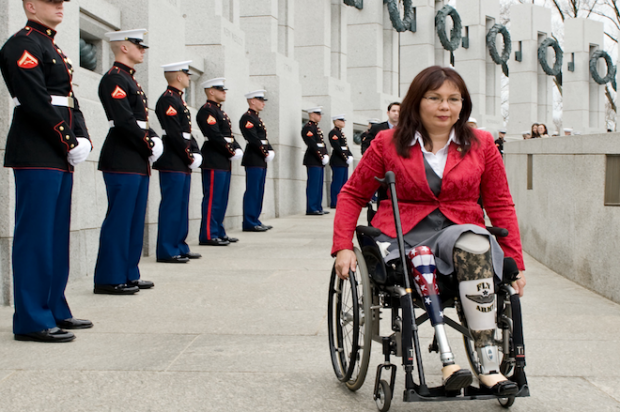
3. Greg Abbott: A Politician in a Wheelchair Who Defied the Odds
Greg Abbott is a prominent politician in a wheelchair, serving as the 48th Governor of Texas. Despite a tragic accident that left him paralyzed, Abbott built a successful legal and political career, proving that leadership is about determination, not mobility. As the first Texas governor to use a wheelchair, Abbott has shaped state and national politics through his strong conservative policies.
Early Life and Education
- Born: November 13, 1957, in Wichita Falls, Texas
- Education:
- Bachelor’s degree in Finance from the University of Texas at Austin
- Law degree from Vanderbilt University Law School
- Early Political Interest: Active in the Young Republicans, setting the foundation for his future in politics.
The Accident That Changed His Life
- At age 26, Abbott was jogging in a Houston neighborhood when a storm caused an oak tree to fall on him, leaving him paralyzed from the waist down.
- His spinal cord injury required steel rods to be implanted in his back, and he has relied on a wheelchair ever since.
- Despite this life-altering event, Abbott remained focused on becoming a successful politician in a wheelchair, demonstrating resilience and perseverance.
Legal and Political Career
Texas Supreme Court Justice (1996–2001)
- Abbott was appointed to the Texas Supreme Court by then-Governor George W. Bush.
- He won two elections to retain his seat, proving his growing influence as a politician in a wheelchair within conservative circles.
Attorney General of Texas (2002–2015)
- Elected as Texas Attorney General, Abbott served three terms, making him the longest-serving Attorney General in Texas history.
- Key Legal Actions:
- Defended Texas’ voter ID laws and conservative policies.
- Sued the federal government over 30 times, challenging the Affordable Care Act, environmental regulations, and immigration policies.
- Successfully argued before the U.S. Supreme Court to keep a Ten Commandments monument on the Texas Capitol grounds.
Governor of Texas (2015–Present)
In 2014, Abbott became the first Texas governor in a wheelchair, winning with strong Republican support. He was re-elected in 2018 and 2022, solidifying his status as a major political force.
Key Policies and Decisions
- Economic Growth & Business Expansion
- Abbott has made Texas a business-friendly state, attracting companies like Tesla, Oracle, and Samsung.
- Passed tax cuts and reduced regulations to promote economic growth.
- Border Security and Immigration
- Advocated for stricter immigration laws, launching Operation Lone Star to deploy National Guard troops to the border.
- Signed laws allowing Texas to arrest migrants in response to federal immigration policies.
- Gun Rights and the Second Amendment
- Signed the permitless carry law, allowing Texans to carry firearms without a license.
- Remained a firm supporter of gun rights, even after mass shootings in the state.
- Abortion and Social Policies
- Signed Texas’ Heartbeat Act (SB 8), banning most abortions after six weeks.
- Supports conservative social policies, including restrictions on transgender participation in sports.
- COVID-19 Policies
- Opposed mask and vaccine mandates, emphasizing personal freedom over government restrictions.
- Signed executive orders banning mask mandates in schools and businesses, sparking national controversy.
Greg Abbott as a Politician in a Wheelchair
- Abbott’s use of a wheelchair has made him a visible example of overcoming adversity in politics.
- Despite his physical disability, Abbott has remained active and engaged, often seen traveling, delivering speeches, and leading legislative efforts.
- As a politician in a wheelchair, he has inspired many individuals with disabilities to pursue careers in law and public service.
Criticism and Controversies
Despite his success, Abbott has faced criticism, including:
- His handling of Texas’ power grid failure during the 2021 Winter Storm, where millions lost power.
- Opposing Medicaid expansion, which critics argue has left many Texans without adequate healthcare.
- His firm opposition to gun control despite repeated mass shootings in the state.
- Cuts to disability services funding, which some view as contradictory given his own reliance on accessibility resources.
Personal Life and Legacy
- Marriage: Married to Cecilia Abbott, the first Hispanic First Lady of Texas.
- Family: They have one adopted daughter, Audrey Abbott.
- Daily Life in a Wheelchair: Abbott uses adaptive equipment to drive and perform daily activities independently.
Why Greg Abbott’s Story Matters
As a politician in a wheelchair, Abbott has redefined what it means to lead with a disability. His determination, legal expertise, and political influence have made him one of the most powerful conservative politicians in America. Despite his critics, Abbott continues to shape Texas’ policies, proving that wheelchairs do not limit leadership—determination does.
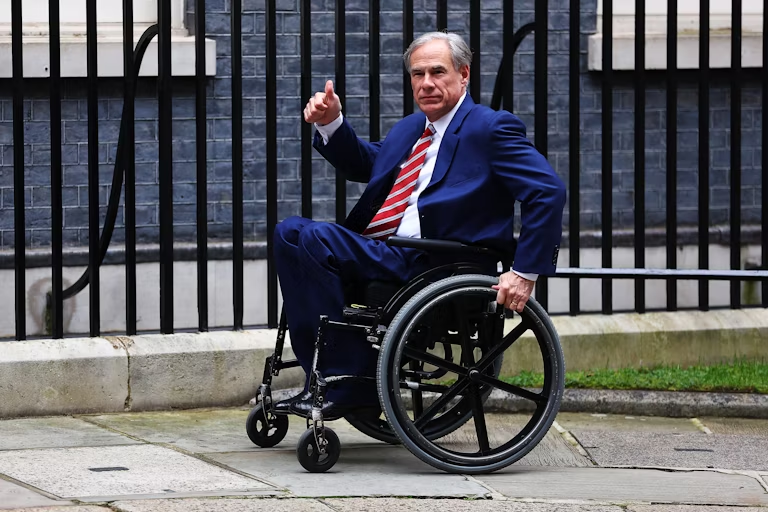
4. John Porter East: A Politician in a Wheelchair Who Championed Conservative Values
John Porter East was a U.S. Senator from North Carolina who overcame paralysis from polio to build a distinguished career as a legal scholar, professor, and conservative politician. Despite facing immense personal and physical challenges, East became a respected voice in American politics, advocating for strong national defense, limited government, and conservative judicial policies. His story is one of perseverance, intellectual rigor, and dedication to public service.
Early Life and Education
- Born: May 5, 1931, in Springfield, Illinois.
- Military Service:
- Served as a lieutenant in the U.S. Marine Corps in the 1950s.
- His military career was cut short when he contracted polio, leaving him permanently paralyzed from the waist down and dependent on a wheelchair.
- Education:
- Earned his bachelor’s degree from the University of Illinois.
- Completed his Ph.D. in Political Science at the University of Florida, focusing on American government and political philosophy.
Academic Career: Becoming a Leading Conservative Scholar
- East spent nearly two decades as a professor of political science at East Carolina University (ECU) in Greenville, North Carolina.
- He was known for his sharp conservative viewpoints and was an outspoken critic of liberal policies, gaining attention for his work on U.S. foreign policy and constitutional law.
- As an academic and wheelchair user, he became a role model for students, showing that intellectual strength is not limited by physical challenges.
Entry into Politics: The Road to the U.S. Senate
- In 1966, he made his first attempt at politics, running unsuccessfully for the U.S. House of Representatives.
- 1980 U.S. Senate Race:
- East ran as a Republican challenger against incumbent Senator Robert Morgan (D-NC).
- His campaign was supported by Senator Jesse Helms, a powerful conservative figure, and the National Conservative Political Action Committee (NCPAC).
- Running on a platform of anti-communism, strong defense, and traditional values, East won the election in a stunning upset.
U.S. Senate Career (1981-1986)
As a politician in a wheelchair, East quickly gained national recognition for his firm conservative stance and support of Ronald Reagan’s policies.
Key Policy Positions and Legislative Work
- Strong National Defense & Anti-Communism
- Advocated for increased military spending to counter the Soviet Union during the Cold War.
- Supported Reagan’s Strategic Defense Initiative (SDI), known as “Star Wars.”
- Pushed for greater funding for the U.S. Armed Forces.
- Judicial and Constitutional Issues
- Opposed judicial activism and was a strong critic of liberal Supreme Court decisions.
- Advocated for strict constitutional interpretation, aligning with conservative legal movements.
- Economic & Domestic Policies
- Supported Reagan’s tax cuts and deregulation policies to boost economic growth.
- Opposed federal government overreach, calling for limited intervention in state affairs.
- Social Conservatism
- A vocal supporter of pro-life policies and traditional family values.
- Opposed the Equal Rights Amendment (ERA), arguing it conflicted with constitutional principles.
- Disability Advocacy
- Though not an outspoken advocate for disability rights, his presence as a politician in a wheelchair helped break barriers in public office.
- He demonstrated that disability was not a hindrance to political leadership, inspiring many with mobility challenges.
Personal Struggles and Tragic Death
Despite his successful career, East struggled with depression and health issues throughout his time in the Senate. His battle with polio had taken a toll on his overall well-being, and the pressures of politics further exacerbated his struggles.
Tragic End
- On June 29, 1986, just months before the end of his Senate term, John Porter East was found dead at his home in Greenville, North Carolina.
- His death was ruled a suicide, a shocking and tragic end to his political career.
- He had previously announced that he would not seek re-election, citing health concerns.
Legacy and Impact
Political Influence
- East’s tenure in the Senate was relatively short, but he left a lasting mark on conservative politics.
- He helped shape Reagan-era Republican policies, particularly on military defense, anti-communism, and judicial conservatism.
- His association with Senator Jesse Helms further cemented his influence on the conservative movement.
Breaking Barriers as a Politician in a Wheelchair
- Though he rarely spoke about disability advocacy, East’s presence in the Senate was historic as one of the few wheelchair-using politicians to serve in national office.
- He showed that individuals with physical disabilities could still effectively legislate, debate, and lead at the highest levels of government.
- His story remains an inspiration for aspiring politicians in wheelchairs who aim to make a difference despite physical challenges.
Remembrance
- While East’s political career was overshadowed by his tragic passing, he is remembered as a brilliant conservative thinker, a dedicated public servant, and a politician who refused to let his wheelchair define him.
Final Thoughts
John Porter East’s journey is one of overcoming adversity, intellectual rigor, and unwavering dedication to conservative values. As a politician in a wheelchair, he proved that leadership is about principles, determination, and conviction. Though his career ended tragically, his legacy continues to inspire those who face obstacles in their pursuit of public service.
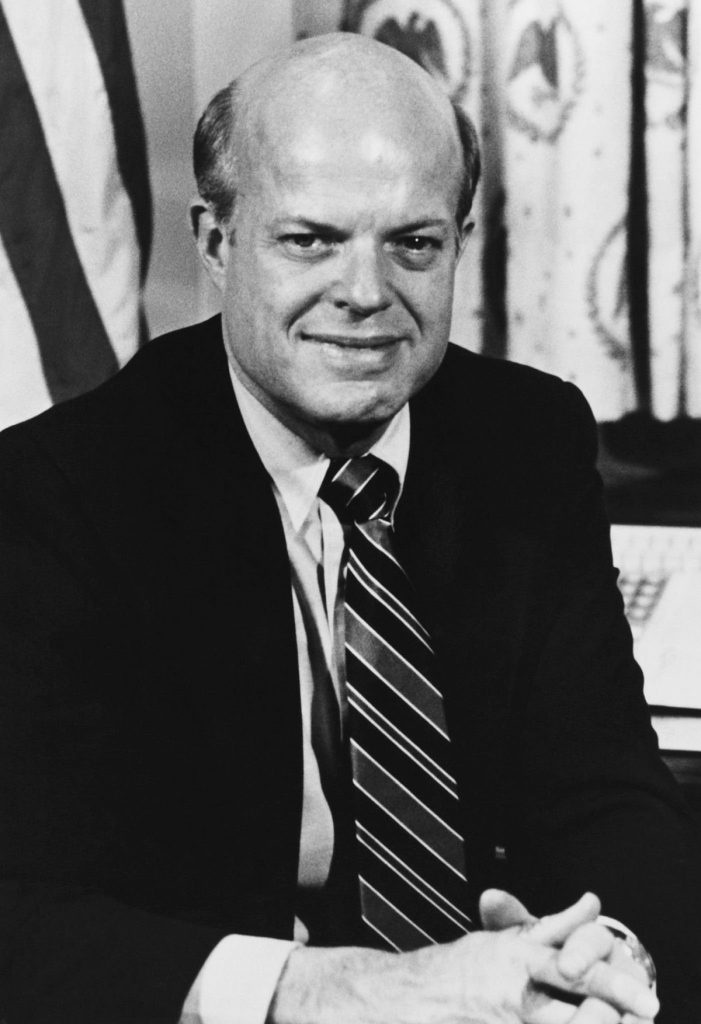
5. David Lega – Sweden’s Trailblazing Politician
Overcoming Physical Challenges
David Lega was born with a rare muscle disease that severely limited his mobility. Doctors doubted he would ever live independently, let alone achieve great things. However, Lega proved them wrong by becoming a world-class Paralympic swimmer.
A Career in Politics
After retiring from sports, Lega transitioned into politics. He served as a city councilor in Sweden and later became a Member of the European Parliament (MEP), where he focused on human rights and disability advocacy.
Championing Inclusion
Lega has used his platform to push for stronger accessibility laws across Europe, ensuring that people with disabilities have the same opportunities as everyone else.
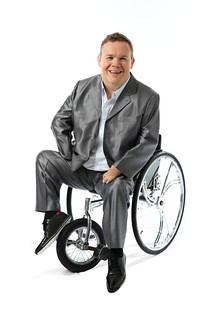
6. Arthur Griffith – The Irish Revolutionary Leader
Political Activism Despite Health Issues
Arthur Griffith was a key figure in Ireland’s struggle for independence. Though he did not spend his entire life in a wheelchair, he suffered from chronic health conditions that often left him physically debilitated. Despite these struggles, he worked tirelessly to form Sinn Féin, the political party that would eventually lead Ireland to independence.
A Pivotal Role in Irish History
As the President of Dáil Éireann, Griffith was instrumental in negotiating the Anglo-Irish Treaty, which led to the establishment of the Irish Free State in 1922. His leadership helped shape modern Ireland, demonstrating that physical health does not determine political effectiveness.
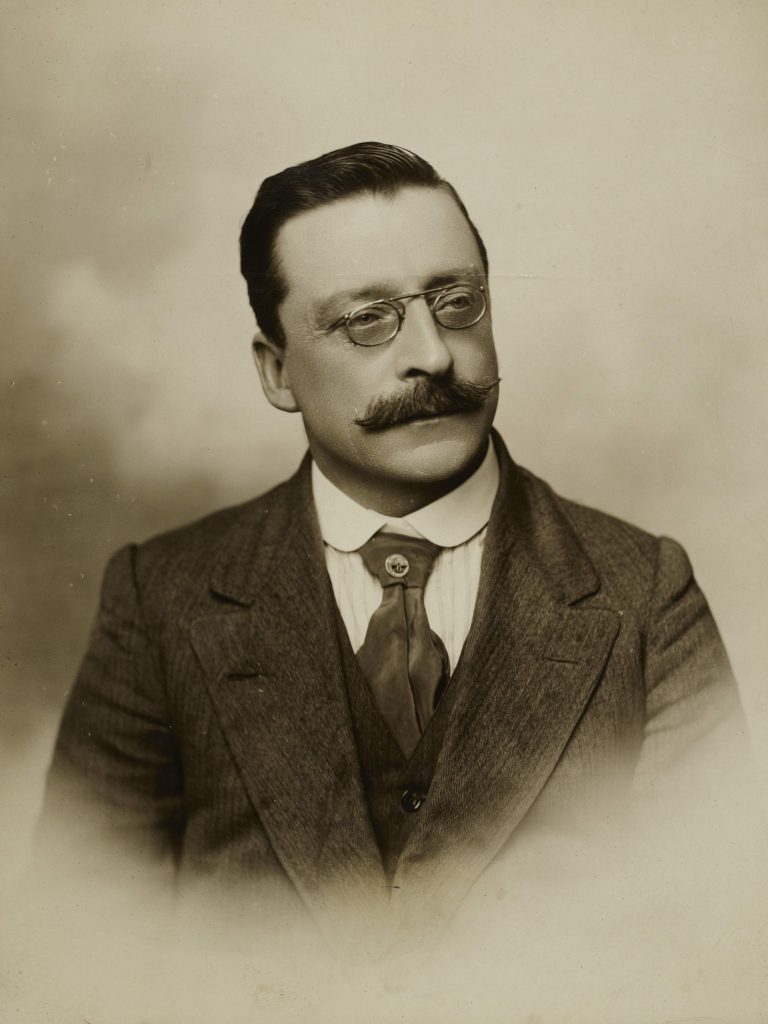
7. Steven Fletcher – Canada’s Resilient Conservative MP
A Devastating Accident
In 1996, Steven Fletcher was involved in a horrific car accident that left him quadriplegic. Despite this life-altering event, he pursued higher education and earned an MBA, determined to continue contributing to society.
Making History in Canadian Politics
In 2004, Fletcher became the first quadriplegic elected to Canada’s House of Commons. He served as Minister of State for Transport, where he worked on accessibility legislation and infrastructure policies.
Advocacy and Legacy
Fletcher’s presence in Parliament forced lawmakers to rethink disability policies. He remains an outspoken advocate for assisted dying laws, disability rights, and government transparency.
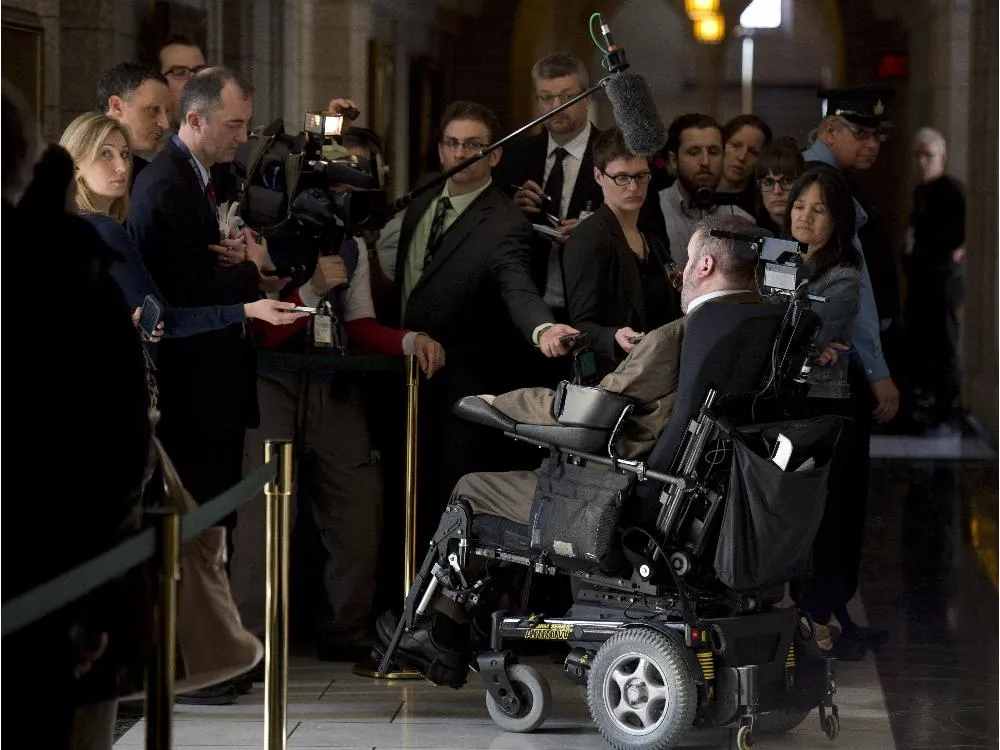
Conclusion
These seven politicians in wheelchairs prove that leadership is about intelligence, dedication, and perseverance—not physical ability. Their use of wheelchairs has not slowed them down. Their stories remind us that no obstacle is too great to overcome, and their contributions to society continue to inspire future generations.
Every year, more families discover the freedom these chairs create—this Black Friday, demand is already building fast. By joining the early-access list, you secure your chance to order before the sale goes public on November 28, 2025.
Since 2019, Sam and Ryan have been demonstrating that nature is wheelchair accessible with the Extreme Motus All Terrain Wheelchair. From National Parks to Skateparks, their adventures prove that a manual off-road wheelchair can offer laughter and joy while navigating diverse terrains.
Join us as we continue to share these inspiring journeys.
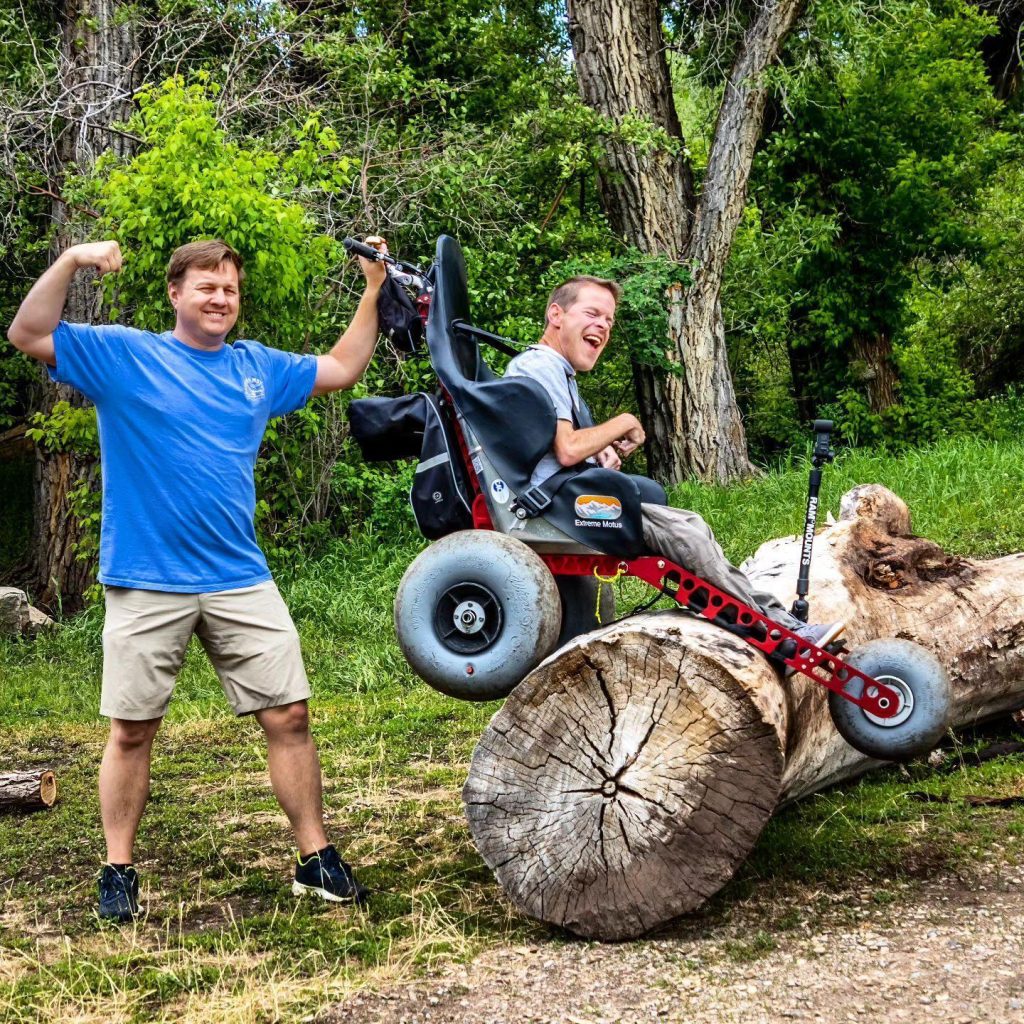
Light, comfortable, and compact, the Extreme Motus glides over sand, rocks, grass, gravel, and even floats in water.
It’s more than a outdoor wheelchair; it’s your ticket to freedom. Embrace the outdoors with confidence, knowing our off-road wheelchair is engineered for durability and ease of use.
Be the first to hear about new gear, upcoming adventures, and exclusive offers. As a welcome gift, enjoy $10 off your first Motus T-Shirt when you subscribe.
By subscribing you agree to receive marketing communications from Extreme Motus, including product updates, promotions, and special offers. I understand I can unsubscribe at any time.



